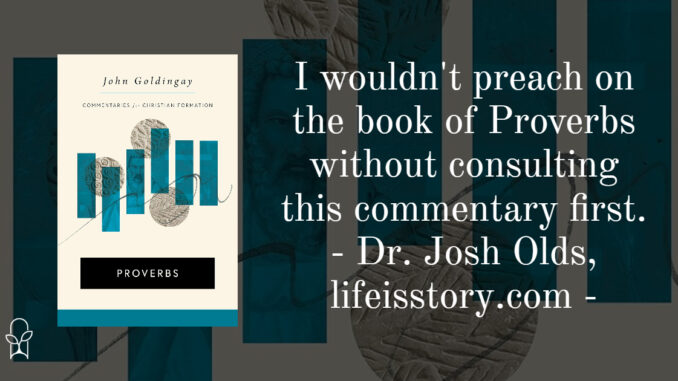
Also by this author: The Book of Lamentations, The Book of Jeremiah
Series: Commentaries for Christian Formation
Published by Eerdmans on October 12, 2023
Genres: Academic
Buy on Amazon
Goodreads

What Proverbs meant to its original audience—and what it means to Christians today
On one hand, Proverbs is perfectly straightforward—a collection of short statements on how to live wisely and well. On the other, the advice of Proverbs, written millennia ago, can seem disconnected from the realities of life today.
John Goldingay’s fresh commentary untangles Proverbs with an eye toward Christian formation. Working from his acclaimed English translation, Goldingay explains each verse in its original context without getting bogged down in technical detail. The commentary centers theological insights beneficial to preaching and pastoral work.
The wisdom of Proverbs can’t be reduced to platitudes. It requires something of the reader: thought, reflection, and openness to the Lord. The Commentaries for Christian Formation Proverbs guides us in the journey of faith seeking understanding.
John Goldingay is a scholar whom I’ve come to describe as approachably academic in style. Goldingay does not sacrifice academic rigor for accessibility, but rather manages to blend the two together to make what other authors and books seem mundane come to life. I’ve been a fan of Goldingay’s writings ever since my introduction to him with the publication of his NICOT volume on Lamentations. Commentaries generally aren’t meant to be read as regular books, from cover to cover, but Goldingay should be the exception. It’s no different for this volume on Proverbs in the Commentaries for Christian Formation series.
This series is a relatively new commentary series coming from William B. Eerdmans Publishing Company, the same company that publishes NICOT/NICNT and other excellent commentary sets. The first volume, on Galatians, released in 2021 headlined by the British theologian N.T. Wright. Goldingay’s Proverbs is the second volume and Hebrews, written by Amy Peeler, will be the third and release in 2024. The focus of the series in faith formation, “serving the church by showing how sound theological exegesis can underwrite preaching and teaching, which in turn forms believers in the faith.” It’s a semi-technical commentary, meaning that while it is geared toward being more academic, it is also accessible to those without much or any knowledge of biblical Hebrew or Greek.
Goldingay begins Proverbs: Commentaries for Christian Formation with a brief introduction to the book, its composition, and theological importance. Goldingay presents Proverbs as a book that encourages learning wisdom for a life lived in awe of Yahweh, emphasizing its practical aspect to make people smart, shrewd, and skilled. He argues that understanding Proverbs requires thought and reflection, as it contains an ethical dimension concerning everyday life. Goldingay also provides his own translation of the text, offering readers a fresh reading that looks and sounds different than what they might be used to—and that by itself invites deeper reflection, discussion, and analysis of the text.
The commentary proper is divided into three sections: Proverbs A (1:1-9:18), Proverbs B (10:1-22:16), and Proverbs C (22:17-31:31). This simple division is guided by his view that the proverbs are universal, independent of date and provenance. He hypothesizes that much of Proverbs B was collected during the monarchic period, Proverbs C in the Second Temple period, and Proverbs A as an introduction to the text in the same period. He suggests the fall of Jerusalem may have been a catalyst for the collection and adaptation of the text. For those steeped in the simple belief that Solomon wrote all of these proverbs during his tenure as king, this may come as a surprise, but almost all academic scholarship sees this book as a collection of texts, some of which may come from or been collected by Solmon, and gathered together in the Second Temple era.
Goldingay then looks at the proverbs chapter by chapter. His writing style makes the commentary accessible and enjoyable for both laypersons and scholars. The book refrains from over-complicating the origins of Proverbs, instead offering a perspective that appreciates the universality and practical wisdom of the book. Proverbs can be a difficult book to preach or learn from. It’s filled with pithy generalizations full of nuance and metaphor that assume the reader understands the culture and background of the saying. Goldingay is able to bring clarity and applicability to these texts. I wouldn’t preach on Proverbs without consulting this book first!
